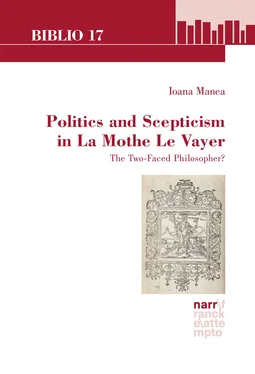Used, in keeping with Sextus, as “patterns or schemata of argument”,3 the ten modes appear numerous times in the works of La Mothe Le Vayer. While applying these modes, the author pays a special attention to the tenth, “that we will find everywhere matter to enrich” (“nous trouverons partout de quoi enrichir”).4 Dealing with “rules of conduct, habits, laws, legendary beliefs, and dogmatic conceptions”, the tenth mode “is mainly concerned with Ethics”.5 Unlike Sextus Empiricus, who through ethics designates the analysis of a value more general than strictly moral, La Mothe Le Vayer approaches ethics especially under its moral aspect.6 In order to illustrate this mode, our writer uses examples of contradictions inspired from his encyclopaedic knowledge. Among others, the reading of the travel accounts proves that the geographical distance results in conflicting customs and ways of life. Thus, the contradictions between two places of the world increase with the distance that separates them. For instance, the Americans and the Japanese are not at the antipodes of Europe only from a geographical point of view, but also from the point of view of the norms that govern their existence. The Japanese take off their coat when they leave the house and put it back when they come back.7 As for certain inhabitants of America, they dance in order to show their sadness and cry in order to show their joy.8
Without limiting himself to the contradictions that may cause the amusement or the curiosity of the public, La Mothe Le Vayer inserts sometimes in his works contradictions that may shock his readers. In so doing, he mentions cases that, beneath the surface, seem to question the consensus around the precept “Do not do unto others what you would not want done to yourself”, which the Christian ethics is supposed to share with the pagan ethics.9 Thus, he chooses examples that pertain to what should be the respect for the other’s life and property.
Despite being, apparently, indispensable for the birth and the preservation of human societies, the respect for another’s life is not unanimously approved. Being more appalling than the murder, to which it cannot be reduced, cannibalism is commonly practised by certain societies. In countries like China, where the “butcher’s shops” (“boucheries de la Chine”) are “stocked with human flesh” (“garnies de chair humaine”),10 people do not seem to have qualms about feeding on other people’s flesh. Moreover, there are places on earth where the practice of cannibalism does not shrink back from family relationships or filial piety, which for most Europeans, are supposed to be sacred. On the one hand, “within the big kingdoms of Mexico and Peru, the husband would freely eat his wife, the brother his sister, the father his son” (“Dans ces grands royaumes de Mexico et du Pérou, le mari mangeait librement sa femme, le frère sa sœur, le père son fils”).11 On the other hand, in the Moluccas, whoever wants to offer a good meal to his friends is free to give them his neighbours’ father to eat, provided that he offers his own in return.12 Similar to murder or to cannibalism, theft is not always condemned. Certainly, there are places like Carinthia, a duchy belonging to what is today Austria, where theft is so much loathed that those who are suspected of it are hanged first and judged afterwards. Therefore, the only comfort that is granted to those who are rehabilitated after the trial consists in being buried with dignity.13 Nonetheless, unlike Carinthia, there are places where the thieves recognised as such and condemned increase the prestige of their descendants. This happens, for instance, in countries like the one “of the thieves” (“des larrons ”), “where it is held for such a high honour to have had family members hanged for the perpetrated thefts, that it is reproached as a sort of infamy not to have had anyone executed by the judiciary for such a nice cause” (“où l’on tient à si grand honneur d’avoir eu des parents pendus pour des vols commis, qu’on s’y reproche comme une espèce d’infamie, si l’on n’en a point eu d’exécutés en justice pour une si belle cause”).14
Moreover, the distance from what, for most of the readers of La Mothe Le Vayer, should represent a generally admitted moral norm, is not encountered only in the case of the “barbarian” peoples. Far from being specific to the inhabitants of a “very remote, savage, unpolished, cruel country” (“un pays fort éloigné, sauvage, mal poli, cruel”),15 the deviations from the moral prescriptions which are supposed to give birth to a general consensus have been practised even by peoples “who pretended, either in Greece, or in Italy, or in other regions, to respect philosophy” (“qui ont fait profession, soit en Grèce, soit en Italie, ou en quelque autre région, de respecter la philosophie”).16 Philosophers themselves who, through their thoughts, should inspire the moral order of societies, have, on several occasions, adopted the most unexpected positions. For instance, La Mothe Le Vayer mentions the cases of Chrysippus and Zeno, who have defended incest.17 By annihilating the frontiers between civilisation and barbarism, the examples that La Mothe Le Vayer uses in order to illustrate the tenth sceptical trope represent a virtual trip, meant to have the same result as the journey that he recommends to the addressee of one of his letters:
Do not forget to cultivate this nice part of the sceptical philosophy, which highlights the different customs of peoples. […] The suspension of judgment that you will acquire on so many ways of doing and diverse opinions among which every nation holds its own to be the best will place you in this happy and glorious position among philosophers.
N’oubliez pas de cultiver cette belle partie de la sceptique, qui fait remarquer les différentes coutumes des peuples. […] La suspension d’esprit que vous acquerrez sur tant de façons de faire et d’opinions diverses, dont chaque nation tient la sienne pour la meilleure, vous placera dans cette heureuse et glorieuse assiette entre les philosophes.18
Leading to the tranquillity of mind, which is the end of the intellectual journey made by the sceptical philosopher, the suspension of judgement or the épokhè results from the juxtaposition of contradictions that pertain to the tenth sceptical mode. Conspicuously more present than the other nine, this tenth mode forms together with them a “convenient reunion of topoi” (“Topique commode”) that serves to oppose “the appearances one to another incessantly and in all possible ways” (“incessamment et de toutes les façons possibles les apparences les unes aux autres”).19 In the view of La Mothe Le Vayer, the contradictions in the perceptions of a certain phenomenon show that individuals should not try to grasp the reality that is beyond what is apparent or plausible, with which they are under the obligation to content themselves. In order to bring out the insurmountable character of the constraints that delimit human knowledge, La Mothe Le Vayer derives them from the hostility of the divinity towards the attempts to go into its secrets: “the gods did not want our mind to extend its sphere of action beyond the apparent and the plausible, let us satisfy ourselves with the boundaries that the divinity has imposed upon us, which we would to no avail try to overstep” (“les dieux n’ont pas voulu que notre esprit étendît sa sphère d’activité plus loin que l’apparent et le vraisemblable, contentons-nous doucement des bornes que leur providence nous a prescrits, lesquelles, aussi bien, nous tâcherions en vain d’outrepasser”).20
In the course of the approach that consists in bringing together contrary conceptions of the same phenomenon, the author pretends not to be concerned about the differences between their different degrees of plausibility. Thus, without claiming to provide an exhaustive view of the different interpretations of the same phenomenon, he assumes that they are equally plausible and that, consequently, they represent arguments of equal force, also called isostheneia . The “simple game of shift between the for and against” (“simple jeu de bascule entre le pour et le contre”) used by La Mothe Le Vayer in order to fill out his works seems to be a “goal in itself” (“une fin en soi”).21 As a faithful heir of Sextus Empiricus, he concludes that the imperative solution is not the choice between apparently valid arguments, but the suspension of judgement. In order to illustrate his incapacity to reconcile himself to agree with one of these arguments, he puts forward the example provided by Buridan’s ass:
Читать дальше












